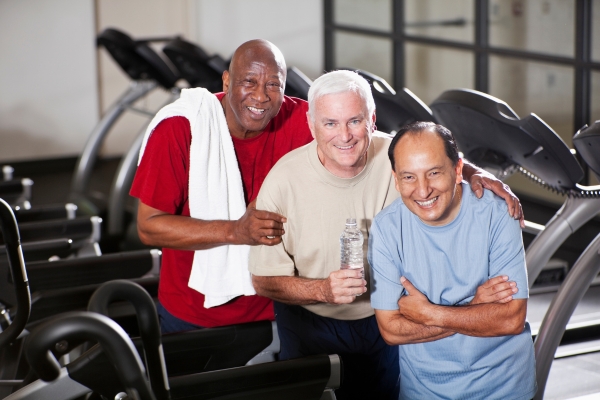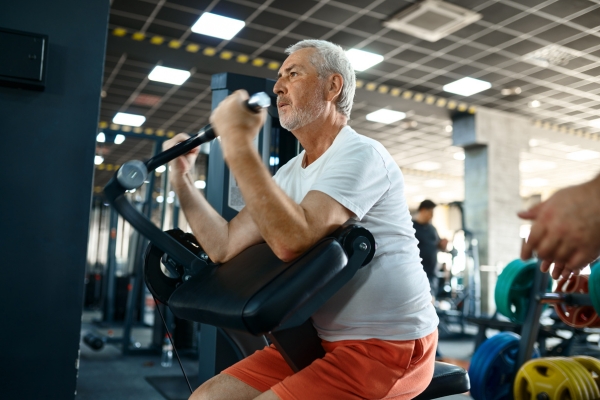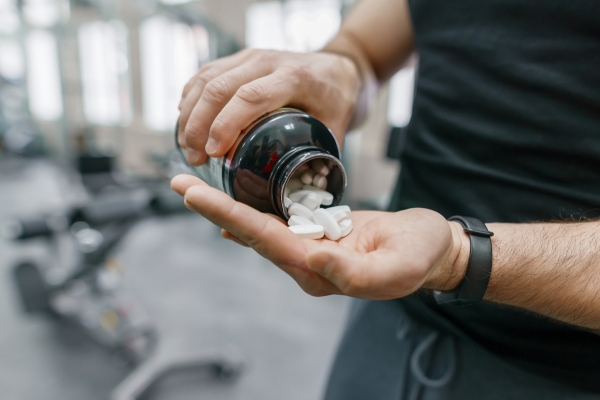Reaching the age of 50 often marks a turning point for many men, as they start to notice significant changes in their health and fitness.
Energy levels dip, muscle strength declines, and metabolism slows down.
These changes affect physical appearance but also impact quality of life while increasing the risk of chronic diseases.
These transitions can be frustrating and overwhelming, leaving you unsure where to begin or how to adapt.
But there’s good news: it doesn’t have to be a downhill journey.
This article provides a practical guide to regaining your vitality through targeted fitness, nutrition, and supplements designed specifically for men over 50.
We’ll show you how to reclaim your energy, maintain your strength, and optimize your health, turning this phase of life into an enjoyable and thriving period.

Understanding Changes in Men’s Health After 50
Turning 50 brings a whole new set of challenges for guys.
Let’s break down what’s happening in your body as you hit this milestone, so you know what to expect.
Decrease in Testosterone Levels
Yep, the big T starts to dip as we get older.
It’s natural and affects a bunch of stuff like muscle mass, mood, and even your sex drive.
It’s like the fuel gauge dropping — things don’t run as smoothly or energetically as before. [1]
Muscle Mass Reduction
Ever notice how it gets tougher to keep the muscles toned and feeling strong?
That’s sarcopenia kicking in.
Our muscles naturally shrink and weaken, making it harder to stay stable and strong as we age. [2]
Increased Body Fat
It feels like one day you can eat anything without gaining a pound, and the next, every extra snack sticks around your waist.
That’s because our metabolism slows down, and suddenly, fat loves to hang out, especially around the belly.
This isn’t just about fitting into your jeans.
It’s a health risk, upping chances for heart issues and diabetes. [3]
Bone Density Decrease
Our bones get more fragile over time.
Thanks to hormonal changes, they lose density, making them more prone to breaks.
It’s important to keep an eye on this to avoid serious injuries from simple falls. [4]
Joint Stiffness and Pain
Ever get up and feel like the Tin Man needing an oil can?
Joints start to wear out and get stiffer, and sometimes they can really hurt.
It’s mostly wear and tear but think about it like old door hinges that squeak and resist movement. [5]
Cardiovascular Changes
The heart and blood vessels go through changes too, making it tougher to keep cardiovascular diseases at bay.
Fat distribution shifts, cholesterol can get out of whack, and blood pressure might rise, which means the heart has to work harder. [6]
Cognitive Changes
Ever walk into a room and forget why?
Well, cognitive functions, like memory and problem-solving, can start to lag a bit.
It’s due to less blood flow to the brain and slower neural connections. [7]
Emotional and Psychological Changes
Hormonal changes don’t just hit the body; they mess with the mind too.
Mood swings, feeling low, anxiety — it’s more common than you think and part of this whole aging package. [7]
Reduced Skin Elasticity and Health
Our skin isn’t spared either.
It loses its stretch, gets drier, and wrinkles start to make permanent guest appearances.
It’s all part of losing collagen and elastin, plus years of battling the elements. [8]

The Role of Fitness in Aging
Hitting the big 5-0 means a lot more than just qualifying for some senior discounts.
It’s a crucial time to ramp up your fitness game.
Trust me, staying active is one of the best ways to keep a lot of those annoying age-related issues at bay.
Why You Really Need to Keep Moving
Think of your body like a car. At 50, it’s a classic—needs a bit more TLC but still has plenty of miles left!
Exercise keeps the engine running smoothly, helps fight off rust (aka stiff joints!), and keeps you cruising along.
It helps with everything from muscle tone and joint health to keeping your heart ticking nicely and your mind sharp.
Exercising Over 50
Here’s what kind of exercise works best:
Strength Training: No need to go all Hulk, but lifting some weights is key. It keeps your muscles from wasting away and your bones strong. Try using lighter weights with more reps. It’s easier on your body while still being super effective.
Cardio: Get that heart rate up with some low-impact stuff like walking, swimming, or cycling. It’s easier on your knees and back, and you’ll still burn calories and keep your heart in shape.
Stretch and Balance: Throw in some yoga or Tai Chi. These are awesome for keeping you limber and improving balance, which is super important to avoid falls.
Functional Fitness: Focus on moves that mimic daily activities. Things like squats (like you’re getting out of a chair) or arm lifts (like you’re putting stuff on a shelf). This helps in keeping you independent—because who wants to struggle with everyday stuff?
Making It Stick
Here are some tips for staying consistent with daily fitness:
Start Easy: If you’re not used to working out, start small. Even 10 minutes a day can kickstart your fitness.
Keep It Regular: Try to make it a habit. It’s better to walk every day for 15 minutes than to push hard once a week.
Variety is the Spice of Life: Mix it up to keep it interesting. Swap between different activities so you don’t get bored.
Set Achievable Goals: Set goals that make you want to high-five yourself without going overboard. Small wins build up to big successes.
Listen to What Your Body Says: Seriously, if something hurts, take a step back. Adapt your exercises to fit how you feel.

Nutritional Needs for Men Over 50
Alright, let’s talk about fueling up right in your 50s.
As we get older, our bodies don’t handle food the same way they did when we were younger.
So, tweaking your diet is key to keeping you feeling like a million bucks.
How Your Nutritional Needs Shift
First off, your metabolism isn’t what it used to be—it’s slowing down, and that means you don’t need as many calories as before.
But—and it’s a big but—you still need just as many nutrients, if not more, to deal with aging.
Key Nutrients You Can’t Skip
These are some of the most important nutrients that need to be a part of your daily diet:
Protein: This is huge for maintaining muscle mass, which you lose naturally as you age. Lean meats, fish, eggs, and plant-based options like beans and lentils are great sources.
Calcium and Vitamin D: Both are critical for bone health, which gets more important every year. Dairy products, fortified foods, and a bit of sunlight for Vitamin D are your friends here.
Omega-3 Fatty Acids: Great for your heart and your brain. You can find these in fish like salmon and trout, as well as in flaxseeds and walnuts.
Magnesium: Magnesium is key for over 300 body processes, like muscle and nerve function, heart rhythm, bone strength, and regulating blood sugar and pressure—essential for avoiding issues like heart disease as we age. Load up on magnesium with foods like spinach, nuts, pumpkin seeds, whole grains, salmon, and mackerel.
Fiber: Keeps your digestive system running smoothly and can help fight against that pesky weight gain by making you feel fuller, longer. Fruits, vegetables, and whole grains are your go-tos.
Potassium: This helps manage blood pressure, which can be a bigger issue as you get older. Bananas, potatoes, and spinach are packed with potassium.
B Vitamins: Particularly B12, which isn’t as easily absorbed from food once you hit your 50s. It’s vital for keeping your nerves and blood cells healthy. Meat, fish, and dairy products are good sources, and you might want to talk to your doc about supplementation if you’re not getting enough.
Dietary Tips to Keep You Ticking Like a Clock
Here are some ways to ease into new nutritional habits that will support your health well into your golden years:
Watch Your Portions: With a slower metabolism, overeating is a quick path to weight gain. Focus on quality, not quantity.
Stay Hydrated: You might not feel as thirsty as you used to, but your body still needs plenty of fluids. Water is always the best choice.
Plan Your Meals: Think about what you’re going to eat ahead of time to ensure you’re getting the right mix of nutrients.
Limit Salt and Sugar: Too much salt can raise your blood pressure, and excess sugar can mess with your energy levels and lead to weight gain.
Eat Regularly: Don’t skip meals. Consistent eating schedules help regulate your metabolism and prevent binging.

Supplements to Support Men’s Health Over 50
As we get older, even the best diets might need a little backup, especially when it comes to nutrients like vitamin D, magnesium, omega-3s, and probiotics.
Here’s why these supplements are crucial for men over 50 and how to choose and use them safely.
Vitamin D and Magnesium
These two often go hand in hand because magnesium helps activate vitamin D, which is essential for bone health, immune function, and reducing inflammation.
As sun exposure — a natural source of vitamin D — often decreases with age, supplementing can help maintain levels which prevent a host of health issues including osteoporosis and decreased muscle strength. [9]
Look for supplements that combine vitamin D with magnesium for the best absorption and effectiveness.
Omega-3 Fatty Acids
Omega-3s are fantastic for your heart, brain, and joints.
They help reduce inflammation, which is linked to heart disease, arthritis, and other health problems common in older adults. [10]
Fish oil is a popular omega-3 supplement, but if you’re vegetarian or vegan, look for algae-based options.
Probiotics
Keeping your gut healthy is crucial as you age since a significant part of your immune system is there.
Probiotics help balance your gut bacteria, which improves digestion, boosts immunity, and might even help you manage your weight. [11]
Choose probiotics with multiple strains of bacteria, as this will benefit your gut health more comprehensively.
How to Select High-Quality Supplements
Here’s how you’ll know whether the supplement you’re considering is a good choice:
Check for Certification: Look for products that have been third-party tested and certified by organizations like the USP (U.S. Pharmacopeia) or NSF International.
Read Labels Carefully: Pay attention to the dosage and ingredients to ensure there are no fillers or unnecessary additives.
Consult with a Healthcare Provider: Especially if you’re taking other medications, it’s crucial to talk with your doctor to avoid any potential interactions.
Integrating Supplements into Your Routine
When it comes to making supplements a part of your daily routine, consistency is key.
Make taking supplements a part of your daily routine—perhaps with breakfast or dinner—to help you remember.
Also, keep an eye on how your body reacts to new supplements and adjust as necessary with guidance from your healthcare provider.

Your Health, Our Priority: Try Our Bundle
Navigating the health changes that come with turning 50 can be a challenge, but with the right support from fitness, nutrition, and supplements, you’re setting the stage for a healthier, more vibrant future.
Remember, the goal is not just to add years to your life but to add life to your years—ensuring those years are as fulfilling and healthy as possible.
At Critical Nutrition Labs, we understand the unique needs of men over 50.
That’s why we offer a specially curated supplement bundle that includes vitamin D with magnesium, probiotics, and omega-3s—three key nutrients that support bone health, heart health, cognitive function, and digestive health.
This bundle is designed to address common deficiencies and boost your overall health as you age.
Don’t wait to take control of your health.
Check out our Men’s Health Over 50 Supplement Bundle today and take a proactive step towards maintaining your vitality and well-being.
With the right supplements in your corner, you’re well on your way to enjoying a healthier, more active lifestyle at 50 and beyond.
References
Clinical Interventions in Aging
Stanworth RD, Jones TH. Testosterone for the aging male; current evidence and recommended practice. Clin Interv Aging. 2008;3(1):25-44. doi: 10.2147/cia.s190. PMID: 18488876; PMCID: PMC2544367.
World Journal of Men's Health
Shin MJ, Jeon YK, Kim IJ. Testosterone and Sarcopenia. World J Mens Health. 2018 Sep;36(3):192-198. doi: 10.5534/wjmh.180001. Epub 2018 May 11. PMID: 29756416; PMCID: PMC6119844.
Front Endocrinol
Ponti F, Santoro A, Mercatelli D, Gasperini C, Conte M, Martucci M, Sangiorgi L, Franceschi C, Bazzocchi A. Aging and Imaging Assessment of Body Composition: From Fat to Facts. Front Endocrinol (Lausanne). 2020 Jan 14;10:861. doi: 10.3389/fendo.2019.00861. PMID: 31993018; PMCID: PMC6970947.
PMC Canada Author Manuscripts
Papaioannou A, Kennedy CC, Cranney A, Hawker G, Brown JP, Kaiser SM, Leslie WD, O'Brien CJ, Sawka AM, Khan A, Siminoski K, Tarulli G, Webster D, McGowan J, Adachi JD. Risk factors for low BMD in healthy men age 50 years or older: a systematic review. Osteoporos Int. 2009 Apr;20(4):507-18. doi: 10.1007/s00198-008-0720-1. Epub 2008 Aug 29. PMID: 18758880; PMCID: PMC5104557.
British Journal of General Practice
Grime J, Richardson JC, Ong BN. Perceptions of joint pain and feeling well in older people who reported being healthy: a qualitative study. Br J Gen Pract. 2010 Aug;60(577):597-603. doi: 10.3399/bjgp10X515106. PMID: 20822692; PMCID: PMC2913739.
Przeglad Lekarski
Jóźwiak P, Szmagaj A. Charakterystyka zachowań zdrowotnych mezczyzn po 50 roku zycia w Poznaniu w odniesieniu do czynników ryzyka wystapienia chorób sercowo-naczyniowych [Health behaviours among men age > 50 years with reference to risk factors cardiovascular diseases]. Przegl Lek. 2012;69(10):934-9. Polish. PMID: 23421064.
Springer
Yeap BB, Flicker L. Testosterone, cognitive decline and dementia in ageing men. Rev Endocr Metab Disord. 2022 Dec;23(6):1243-1257. doi: 10.1007/s11154-022-09728-7. Epub 2022 May 28. PMID: 35633431; PMCID: PMC9789006.
Dermato-Endocrinology
Ganceviciene R, Liakou AI, Theodoridis A, Makrantonaki E, Zouboulis CC. Skin anti-aging strategies. Dermatoendocrinol. 2012 Jul 1;4(3):308-19. doi: 10.4161/derm.22804. PMID: 23467476; PMCID: PMC3583892.
Endocrine
Giustina A, Bouillon R, Dawson-Hughes B, Ebeling PR, Lazaretti-Castro M, Lips P, Marcocci C, Bilezikian JP. Vitamin D in the older population: a consensus statement. Endocrine. 2023 Jan;79(1):31-44. doi: 10.1007/s12020-022-03208-3. Epub 2022 Oct 26. PMID: 36287374; PMCID: PMC9607753.
Brain Sciences
Loong S, Barnes S, Gatto NM, Chowdhury S, Lee GJ. Omega-3 Fatty Acids, Cognition, and Brain Volume in Older Adults. Brain Sci. 2023 Sep 2;13(9):1278. doi: 10.3390/brainsci13091278. PMID: 37759879; PMCID: PMC10526215.
World Journal of Clinical Cases
Rondanelli M, Giacosa A, Faliva MA, Perna S, Allieri F, Castellazzi AM. Review on microbiota and effectiveness of probiotics use in older. World J Clin Cases. 2015 Feb 16;3(2):156-62. doi: 10.12998/wjcc.v3.i2.156. PMID: 25685762; PMCID: PMC4317609.

